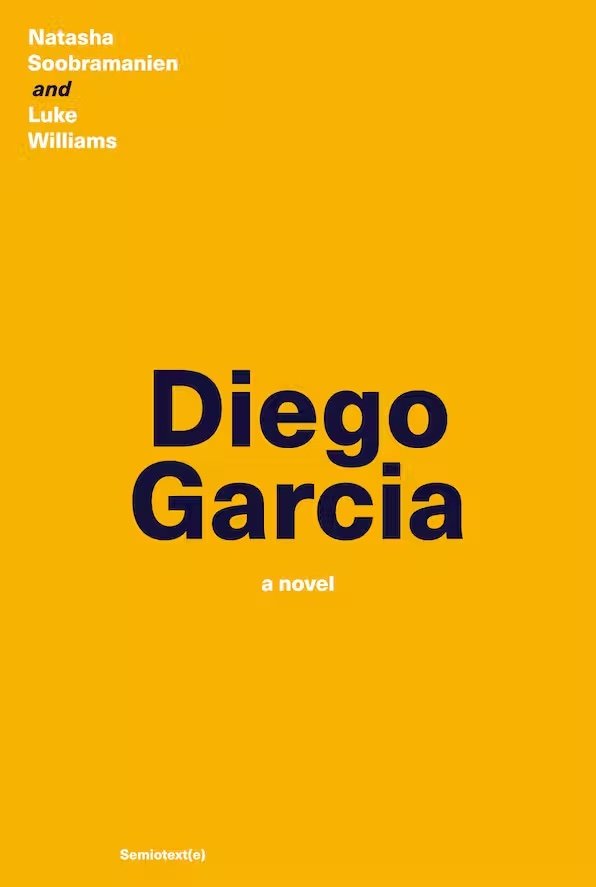DIEGO GARCIA: A NOVEL
By Natasha Soobramanien and Luke Williams
August 2014. Two friends, writers Damaris Caleemootoo and Oliver Pablo Herzberg, arrive in Edinburgh from London, the city that killed Daniel—his brother, her frenemy and loved by them both. Every day is different but the same. Trying to get to the library, they get distracted by bickering—will it rain or not and what should they do about their tanking bitcoin?—in the end failing to write or resist the sadness which follows them as they drift around the city.
On such a day they meet Diego, a poet. They learn that Diego’s mother was from the Chagos Archipelago, that she and her community were forced to leave their ancestral islands by soldiers in 1973 to make way for a military base. They become obsessed with this notorious episode in British history and the continuing resistance of the Chagossian people, and feel urged to write in solidarity. But how to share a story that is not theirs to tell?
Sad, funny and angry, this collaborative fiction builds on the true fact of another: a collaborative fiction created by the British and US governments to dispossess a people of their homeland.
“Intimate yet expansive, heartbroken but unbowed, and a book about writing that is anything but solipsistic, it's a stirring novel that lights a way forward for politically conscious fiction.”
—Anthony Cummins, The Guardian
“This thought-provoking, brilliant book sends a hypersensitive probe into the subduction zone between solidarity and exploitation.”
—Nell Zink
“Focusing on the ongoing atrocity of the Anglo-American occupation of the Chagos Islands and displacement of their native people, Diego Garcia is a subtle contemplation of the uses of fiction and narrative (for good and bad) and how, where and why individual and collective narratives meet. Taking in artists from Kader Attia to Sophie Podolski, as well as depictions of the Chagossians in poetry, documentaries and essay films, it is a moving study of friendship, allyship and creative forms of political struggle.”
—Juliet Jacques
“Through the intricately woven histories and the corresponding fictions within fictions, the compassion expressed in Diego Garcia highlights the absence of it in those who, forsaking their obligations towards other human beings, exiled the Chagossians from their home. Written in a language at once distant and interior, dazzling, we see that until the Chagossian people are home, nobody is home.”
—Vanessa Onwuemezi
“As affecting as it is intellectually agile, Diego Garcia achieves what few novels even aim at—it opens up fresh ways of reading both history and fiction.”
—Pankaj Mishra
“Diego Garcia is an important and highly original work, incredibly well-researched and thought-through.”
—Philippe Sands
“Diego Garcia is a beautiful, poignant, anarchic experiment in collaboration and collectivity. This novel does wonderful, innovative things to form and to politics—to style, to voice, to creolization, to propaganda and power and archipelic thinking—and especially to the denials inbuilt to British novels and British politics. Somehow it finds a way of exposing Britain's ongoing shameful occupation of the Chagos Islands while also being a document of literary resistance and originality. It offers models for future thinking.”
—Adam Thirlwell
“I read Diego Garcia as a manual to navigate the present: pull any thread and follow where it takes you. Use your higher education to understand abstractions: cryptocurrency, legal fictions, national debt. Mistrust love, trust friendship. Exercise solidarity like a muscle. Come out collectively on the other side of sadness.”
—Annette Weisser, Texte Zur Kunst
Paperback, 264 pp.
Published June 21, 2022
